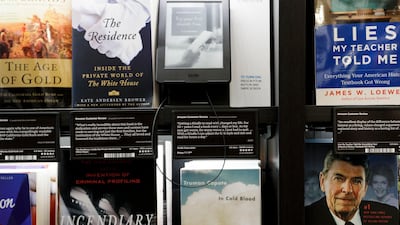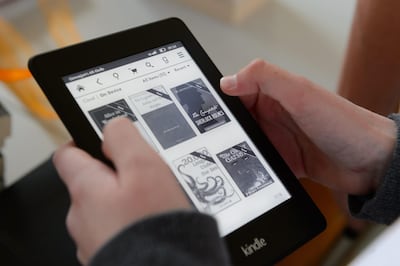Every week, we find two people with opposing (or at least different) views on a topic to discuss the day's big (and small) issues. This week, we're asking two of The National's biggest bookworms whether its better to read on a Kindle or stick to the printed page.
Rupert Hawksley: I sometimes see people reading a Kindle on the bus or plane and feel immensely sad for them. Before they even opened the first page, they had missed out on so many of the joys of reading – browsing in bookshops, the smell of the new pages, the beautiful cover designs. I'm sorry, but you simply cannot package all of that up in a little black rectangle.
Emma Day: I used to feel the same, and even gave a little (inaudible) groan of incredibly ungrateful disappointment when I unwrapped a Kindle on Christmas Day in 2015. But then, on my first long-haul trip from New Zealand to the UK that summer, one very clear fact swayed my mind – you can carry more titles in that little black rectangle than you ever can on your person. That Kindle saved me on 45+ hours of travelling, where I raced through two novels alone. And gone are the days where my holiday suitcase is weighed down by 10 paperbacks.
RH: You obviously need to develop a better 'wow-thank-you-so-much' face.
ED: Absolutely, I was a horribly selfish gift receiver that year
RH: That 45-hour journey to New Zealand is probably one of the longest you've done, though, and you only really needed two novels. I'm sure you could have managed to carry them. Or was it the complete works of James Joyce and Marcel Proust?
ED: Well, there was a necessary amount of sleeping done within those hours. But the beauty of a Kindle is that, should I have needed more than those two novels, I have an entire bookshop at my fingertips. Now, I hasten to add that I see a Kindle as a tool that can supplement a collection of musty-smelling paperbacks that I still pick up on a regular basis. Do you not think it a worthwhile extension to your library?
RH: I can understand the logic but can it ever really be a supplementary tool? Once you can buy all the books you could ever need from the comfort of your sofa, why would you ever venture out? This is what technology does. It promises freedom and then takes it away. Do you feel excited when you order a new book on the Kindle? Because going to a bookshop remains one of my favourite things to do.
ED: I don't disagree, and it definitely doesn't match the mystique and promise of a physical store, with its smells and stacked shelves and hushed whispers. I do feel guilty that I'm contributing to the death of the bookshop; I still frequent them as often as I did pre-Kindle, but now I buy around 60 per cent of my reads on the device. However, the Kindle store is remarkably cheaper, and one could also argue it's more environmentally responsible to go digital.
RH: The environmental argument is persuasive and I would urge publishers to think of ways of making their industry more sustainable. The fact that something is cheaper, though, doesn't necessarily mean it's the right option to go with. I would rather spend a bit more and support bookshops, rather than one of the richest companies in the world. Besides, are e-books really that much cheaper? I did a bit of research on Amazon and the new short story collection by Zadie Smith, for example, is about 50 dirhams, while the hardback is about 54 dirhams. Not much in it and you get a lovely book for your shelf.
ED: Perhaps it's because I use the UK storefront, but you can get a lot of books for around £1 (Dh4.7). As much as one wants to support independent sellers, for families on a tight budget, who may not have easy access to libraries or secondhand bookshops, I do think it's good that there are more cost-effective options out there.
RH: OK, I'm going to have one more go at convincing you. A bookshelf tells the story of your life. It's all there: what you were reading on this holiday or when you were in love with that person. There is something so clinical about the Kindle, which erases these stories. One thing I have heard, though, is that you can read
more quickly on a Kindle. Have you found this?
ED: I'll grant you that, I do miss having my life in books in my home, as a sort of paper comfort blanket. But I just got so frustrated with paying to ship them around the world as I moved from city to city. I digress … I don't think it's made me read much more quickly, but I do find the way it tells you how you're tracking, in percentages, quite motivating. Have you ever tried one out?
RH: Er … no.
ED: Well then, isn't it about high time you gave it a try, just to see if the grass is greener?
RH: Back to the books for me then.


